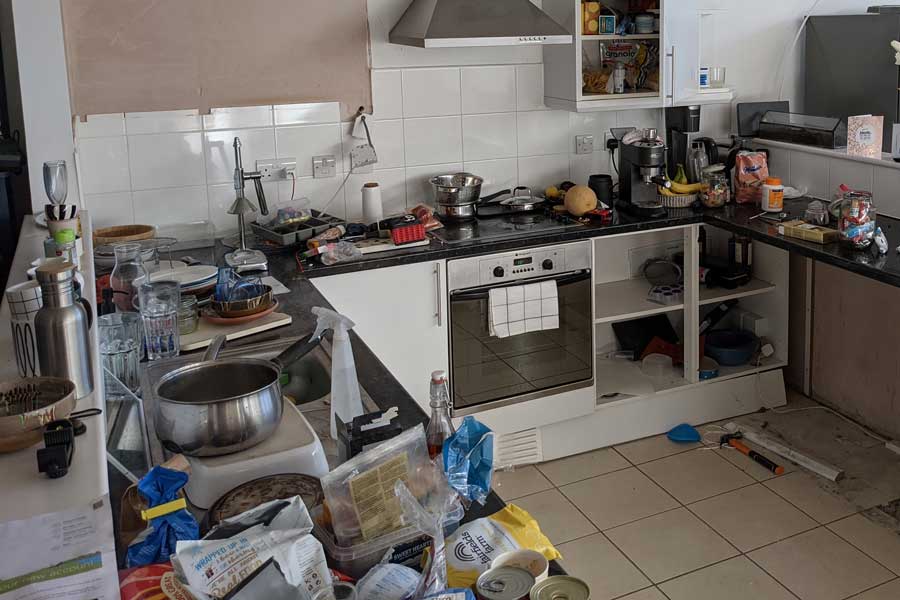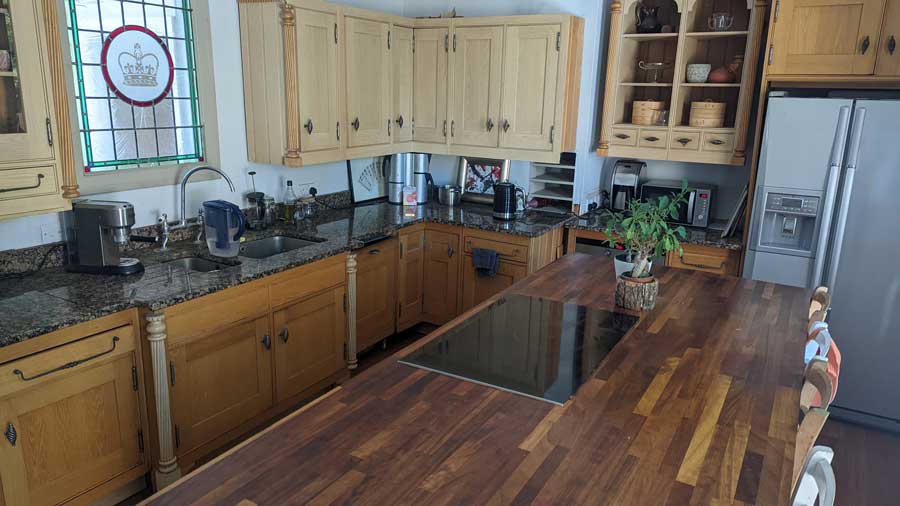When first-time house buyer Josephine Cooke had only owned her house for two months she experienced an unexpected leak that came up through the floor in her living room.
“The whole living area was covered,” says Cooke – a 33-year-old banker from Huntsville, Alabama. “I ended up having to pull up the whole floor from the living area and replace it – it was a mess.”
Finding the source of the leak proved to be difficult because it was in a shared wall with the utility room which unfortunately went right behind the main boiler for the house. It cost $1,250 to fix the pipe, let alone start to repair all the damage on the floor from the water. Even though it was an unexpected expense she says she was lucky because she did not borrow the whole amount she was eligible for when buying her house. She held back and said that she was happy she did. This meant that the house purchase did not drain all her savings and left a nice buffer for her for unseen emergencies.
“I had heard about this kind of thing happening before and so did not want to spend the maximum amount of money that I was able to. Having a buffer in my savings has always been important for me”. She continues “I knew that buying a house was expensive and that the costs only start when you sign the final papers”.
Buying a house is expensive – in fact, it is one of the biggest purchases that most people are likely to make in their lifetime. Most homebuyers, especially if you are buying a property for the first time, don’t understand exactly how expensive it is to maintain a home. The unseen costs of buying a home can be more than the monthly mortgage costs for a home. This is not something that most people anticipate when buying a house.
What Is The Real Cost of Buying Your Dream Home?
Knowing the full cost of your home is important so that you can:
- See if ‘affordable’ truly is affordable. Will the total monthly expenditure be affordable?
- Set aside a certain amount of money (separate from the purchase costs) to avoid going into debt.
- Make sure you have a contingency plan in case you don’t have enough money to cover the bills.
There are expenses that you probably know about – insurance, and property taxes for example. Other commonly known fees are higher utility bills (as an owner) and also home owner association fees (HOA fees). Typically these are taken into account when calculating your monthly budget.
These ‘anticipated costs’ can, unfortunately, be overshadowed by the expenses you might face when maintaining, repairing, and upgrading your property. When renting you can think of all the things your landlord just takes care of, now that you’re the owner you will have to buy them.
How Does The Cost Of Purchase Compare To Upkeep Costs?
There was a study back in 1998 that found that the cost of upgrading, repairing, and maintaining your typical family home over 30 years came to almost four times the purchase price. Keep in mind that this study was undertaken in 1998 when houses cost less, but it still might sound high.
However, at Capital Bean, we interviewed a number of financial planners, and even though this number is probably higher than average they all agreed that maintenance costs for a house ended up being significantly higher than most first-time homebuyers expected.

Renovations might take longer and cost more than you anticipate.
“No one can ever be fully prepared for the costs of homeownership because there are many unknown unknowns,” says Jane Nicols – a financial planner from Dallas, Texas. Even though she knew about the costs involved with buying a property she was still surprised at the unexpected costs. “Just last week a pipe burst – something I thought wouldn’t happen for a long time with this house”. It just goes to show – this is why they are called unexpected.
Make a Budget for Unexpected Expenses Before You Buy
There is a big difference between what people should do and what people do. As the famous quote says if advice was all it took everyone would have a six-pack and be a billionaire. This also comes to what people choose to do when they actually buy their home too.
Some homeowners purchase top-of-the-line remodels that cost them thousands and tens of thousands of dollars whereas others think that they shouldn’t bother with maintenance ever again. This second group can often end up spending lots more down the line instead of spending money on regular maintenance.
It might go without saying but where you live plays a big part in how much you are going to pay for repairs. If you live in a large city and need to repair your roof you will typically spend more than if you live outside the city. There are other variables that can impact your home too:
- How old the house is when you bought it. And the condition it is in for the age.
- The quality of remodeling including what materials are used.
- Your want and ability to do some of the work yourself. Although DIY can end up costing more in the long run sometimes.
- The climate where you live. If it is hot in the summer and cold in the winter this will put a bigger strain on your property.
Should I Hire A Home Inspector?
To give yourself as accurate a picture as possible you can hire a home inspector before you buy the place. This won’t give you all the costs but will give you a more accurate idea of what to look out for. The home inspector will give you a good idea of how long various components in the house are likely to last and a ballpark figure of how much it will cost to repair them now or in the future.
After speaking to a good home inspector you might find that the bargain property you were hoping for will be a money pit in the long run. It could also show that the house that originally looked cheaper on paper will actually be cheaper.
However, even if you buy a new house or one that is run down, you should make sure to put a chunk of money aside each month. You might not need to spend it right now but your future self will thank you when you do need to make some repairs.
Every Situation Is Different When Buying a House
We spoke briefly about how every situation is different – not everyone will spend 4x the amount of the house over the lifetime but there is a good rule of thumb. Typically you will spend 1%-2% of the value of the home each year on repairs. Keep this figure in mind and it will help you budget well as you begin your home ownership journey.
You might not spend that much each and every year but if you put aside 2% each year then over the lifetime of your homeownership it will probably even out to about that amount each year. You’ll probably find you need to replace the roof, fix a broken furnace or repair a major appliance like a fridge or a boiler. Alternatively, it could be spent on smaller things that add up over the year.
If you have recently bought a house then you are used to saving a large percentage of your income each month. Even though you won’t’ need to save quite as much it is still good to continue the saving habit after you have bought the house. This is the best way to continue to top up your house fund – small monthly savings that add up over a period of time.
How Should I Budget for My Home Repairs?
We would suggest that you keep this money separate from your emergency fund which has a slightly different purpose. This money should be used if you face large unexpected expenses that aren’t home-related – losing your job or a large medical expense.
The ongoing costs of home ownership might not be exactly predictable but they are definitely going to happen. This means that you should be saving for them like you do for any other large bill that you’re anticipating.
What Is A Home Equity Line of Credit?
Another thing that you can do preemptively is set up a Home Equity Line of Credit as soon as you are eligible. You should set this up before you need it so that in an emergency you will be able to access the funds without delay. This is a good backup of relatively cheap funding and should only be used for housing – don’t use it for cars or vacations. The main goal for this money is not to access it, but it gives you good peace of mind.
In some cases, you can get a home warranty when you buy a home but don’t expect these contracts to always be watertight. Assume that it will take a long time for a technician to visit your house and then also expect multiple visits before things are replaced. If you assume it will take a long time then you won’t be disappointed when it does and hopefully will have other options.
It’s also important to look closely at what home warranties cover because they don’t cover everything.
It’s Not An Investment, It’s Your Home
The predictable (to an extent) high ongoing costs of ownership are why most financial planners don’t want buyers to look at their homes as investments.
Historically homes appreciate in value at a similar rate to inflation. Once you take into account the insurance, maintenance, repairs, and upgrade costs then you’re probably losing money over the period of time. The one upside is that paying your mortgage each month is a type of savings as it forces you to pay it consistently each month.
This doesn’t mean that you won’t make money from your property – it just means that it shouldn’t be the only reason you buy it.
How Long Will Things In My House Last?
To give you a good idea of how long things will last in your home we spoke to the National Association of Home Builders. Below are the typical life spans of elements of your house:
- Roofing: Average life span of 20 to 30 years depending on what it is made of. If your roof is made of clay, concrete, slate or copper then your roof could last up to 50 years.
- Floor: Carpets – 8 – 10 years. Vinyl up to 50 years linoleum up to 25 years. If you’re using natural materials like slate, marble, granite or wood then they could last up to 100 years with proper care and maintenance.
- Decks and Porches: 20 years if maintained under ideal conditions.
Consumer reports expect the following life spans:
- Furnace (oil): Up to 20 years.
- Gas furnace: 19 years
- Electric furnaces: 14 years
- Aircon: 15 years
- Fridge: 14 years
- Freezer: 10 years
- Washing machine: 9+ years


